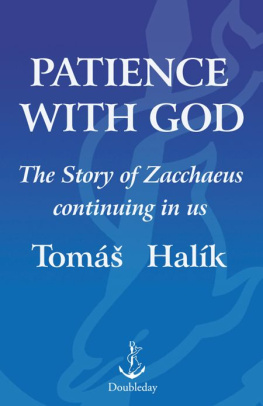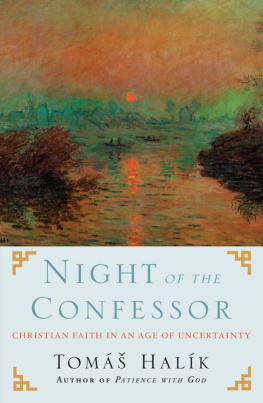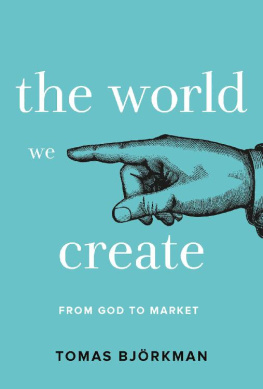Tomáš Halík - Patience with God
Here you can read online Tomáš Halík - Patience with God full text of the book (entire story) in english for free. Download pdf and epub, get meaning, cover and reviews about this ebook. year: 2009, publisher: The Crown Publishing Group, genre: Religion. Description of the work, (preface) as well as reviews are available. Best literature library LitArk.com created for fans of good reading and offers a wide selection of genres:
Romance novel
Science fiction
Adventure
Detective
Science
History
Home and family
Prose
Art
Politics
Computer
Non-fiction
Religion
Business
Children
Humor
Choose a favorite category and find really read worthwhile books. Enjoy immersion in the world of imagination, feel the emotions of the characters or learn something new for yourself, make an fascinating discovery.
Patience with God: summary, description and annotation
We offer to read an annotation, description, summary or preface (depends on what the author of the book "Patience with God" wrote himself). If you haven't found the necessary information about the book — write in the comments, we will try to find it.
Patience with God — read online for free the complete book (whole text) full work
Below is the text of the book, divided by pages. System saving the place of the last page read, allows you to conveniently read the book "Patience with God" online for free, without having to search again every time where you left off. Put a bookmark, and you can go to the page where you finished reading at any time.
Font size:
Interval:
Bookmark:


The prophet refers to some men saying: When they say to you: You are not our brothers, you are to tell them: You are our brothers. Consider whom he intended by these words.
St. Augustine
Patience with others is Love, Patience with self is Hope, Patience with God is Faith.
Adel Bestavros
For the love of God I accept even the strangest thoughts.
St. Thrse de Lisieux
One of the most exquisite pleasures of human love to serve the loved one without his knowing itis only possible, as regards the love of God, through atheism.
Simone Weil
CHAPTER 1
Addressing Zacchaeus
CHAPTER 2
Blessed Are the Distant
CHAPTER 3
Far from All Suns
CHAPTER 4
Barefoot
CHAPTER 5
The Dispute about the Beauty of
Dulcinea del Toboso
CHAPTER 6
A Letter
CHAPTER 7
Unknown Yet Too Close
CHAPTER 8
The Easter Mirror
CHAPTER 9
A Time to Gather Stones
CHAPTER 10
A Time to Heal
CHAPTER 11
St. Zacchaeus
CHAPTER 12
Eternal Zacchaeus
I agree with atheists on many things, often on almost everything except their belief that God doesn't exist.
In today's bustling marketplace of religious wares of every kind, I sometimes feel closer with my Christian faith to the skeptics or to the atheist or agnostic critics of religion. With certain kinds of atheists I share a sense of God's absence from the world. However, I regard their interpretation of this feeling as too hasty, as an expression of impatience. I am also often oppressed by God's silence and the sense of God's remoteness. I realize that the ambivalent nature of the world and life's many paradoxes can give rise to phrases such as God is dead to explain God's hiddenness. But I can also find other possible interpretations of the same experience and another possible attitude to the absent God. I know of three (mutually and profoundly interconnected) forms of patience for confronting the absence of God. They are called faith, hope, and love.
Yes, patience is what I consider to be the main difference between faith and atheism. What atheism, religious fundamentalism, and the enthusiasm of a too-facile faith have in common is how quickly they can ride roughshod over the mystery we call God and that is why I find all three approaches equally unacceptable. One must never consider mystery over and done with. Mystery, unlike a mere dilemma, cannot be overcome; one must wait patiently at its threshold and persevere in itmust carry it in one's heartjust as Jesus's mother did according to the Gospel, and allow it to mature there and lead one in turn to maturity.
I too could not have been brought to faith by the proofs of God's existence found in many pious tomes. If the signs of God's presence lay within easy reach on the surface of the world, as some religious zealots like to think, there would be no need for real faith. Yes, there is also a type of faith that springs from simple joy and enchantment with the world and the way it isa faith that can be suspected of navet, but whose sincerity and authenticity cannot be denied. Faith of this bright and cheerful variety often accompanies the initial enchantment of new converts or suddenly shines forth unexpectedly at precious moments on life's journey, sometimes even in the depths of pain. Maybe it is a foretaste of the enviable freedom found at the supreme phase of our spiritual journey, the moment of the final and total affirmation of life and the world. It is this affirmation that we sometimes hear described as via unitiva or amor fati, as the soul's mystical union with God, or as an understanding and joyful approbation of one's own fate in the sense of Nietzsche's Zarathustra: Was THATlife? Well! Once more!
But I'm convinced that maturing in one's faith also entails accepting and enduring momentsand sometimes even lengthy periodswhen God seems remote or remains concealed. What is obvious and demonstrable doesn't require faith. We don't need faith when confronted with unshakable certainties accessible to our powers of reason, imagination, or sensory experience. We need faith precisely at those twilight moments when our lives and the world are full of uncertainty, during the cold night of God's silence. And its function is not to allay our thirst for certainty and safety, but to teach us to live with mystery. Faith and hope are expressions of our patience at just such momentsand so is love. Love without patience is not real love. I would say it applies both to carnal love and to love for God, were I not sure that there is in fact only one love, that by its nature it is one, undivided and indivisible. Faithlike loveis inseparably linked to trust and fidelity. And trust and fidelity are proven by patience.
Faith, hope, and love are three aspects of our patience with God; they are three ways of coming to terms with the experience of God's hiddenness. They therefore offer a distinctly different path from either atheism or facile belief. In contrast with those two frequently proposed shortcuts, however, their path is a long one indeed. It is a path, like the Exodus of the Israelites, that traverses wastelands and darkness. And yes, occasionally the path is also lost; it is a pilgrimage that involves constant searching and losing one's way from time to time. Sometimes we must descend into the deepest abyss and the vale of shadows in order to find the path once more. But if it did not lead there it would not be the path to God; God does not dwell on the surface.
Traditional theology maintained that, simply by contemplating the creation of the world, human reason could be convinced of God's existenceand this is an assertion with which one can still, of course, agree. (Or, more precisely, reason is capable of reaching that conclusion; nevertheless, the world is an ambivalent reality that theoretically admits other perspectivesand just because human reason is capable of something, that does not mean that each individual's reason must use that capacity.) Yet traditional theology proclaimed that the human conviction about God's existence was something other than simply faith. Human conviction lies in the realm of nature, while faith transcends that realm: it is a giftinfused divine grace. According to Thomas Aquinas, faith is a gift of grace that is infused into human reason, enabling reason to transcend its natural capacity and in a certain limited way to participate in perfect cognition, whereby God recognizes Himself. Yet there remains a tremendous difference between the cognition enabled by faith and the knowledge of God face to face as a beatific vision (visio beatifica), which is reserved for the saints in heaven (i.e., for us too, if we display the patience of our pilgrim faith and our never-entirely-satisfied longing right up to the threshold of eternity).
If our relationship with God were based solely on a conviction of His existence, which can be acquired painlessly through an emotional appreciation of the world's harmony or a rational computation of a universal chain of causes and effects, it would not be what I have in mind when I speak about faith. According to the ancient teachers of the church, faith is a ray of light whereby God Himself penetrates the dark spaces of human life. God Himself is within it like the touch of His ray of light, in the same way that from an enormous distance the sun touches the earth and our bodies with its warmth. And, of course, as with the sun, there are also moments of eclipse in our relationship with God.
Font size:
Interval:
Bookmark:
Similar books «Patience with God»
Look at similar books to Patience with God. We have selected literature similar in name and meaning in the hope of providing readers with more options to find new, interesting, not yet read works.
Discussion, reviews of the book Patience with God and just readers' own opinions. Leave your comments, write what you think about the work, its meaning or the main characters. Specify what exactly you liked and what you didn't like, and why you think so.












